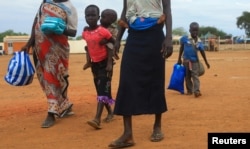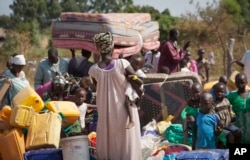South Sudanese fleeing the country’s 3-year conflict say armed men are committing brutal atrocities and abuses against civilians. The refugees said extrajudicial killings also were common in areas they fled.
Nearly all the refugees arriving in the Bidibidi camp in Uganda's Yumbe District over the past few weeks are from the former Equatoria state. Most of them fled from Lainya, Yei, Morobo and Kajokeji.
South Sudanese refugee Chaplain Malesh said he fled his village in Lainya earlier this month when government soldiers and proxy militia began shooting villagers indiscriminately.
"The Dinkas came to our area, at a place called Kirbat, and started shooting. This made people start running. If you see your neighbors running, why should you stay?" Malesh asked.
Malesh, whose father died in the early 1990s and whose mother passed away 10 years ago, said that as the shooting continued, many villagers fled into the bush and hid there for days before making their way to Uganda, as he did.
Families flee to bush
On the journey to Uganda, Malesh said he and his group met hundreds of other South Sudanese fleeing the country because of ongoing fighting.
Clementina Danga, a mother of four from Morobo, was among them. Danga said government soldiers came to her home one day in September and immediately killed her husband as the children watched.
"When they came to our home, my husband began to run. As he was running, they shot and killed him. We then decided to run into the bush," Danga said.
That is where she and her children stayed for the next two months. They did not wait to bury her husband.
Danga said armed men, whom she identified as government soldiers, committed other abuses in her village, forcing many people to run for their lives.
‘Dinkas are killing people’
Patrick Taban, another South Sudanese who fled from Yei, said he observed many atrocities.
"I witnessed very many; the Dinkas shooting the civilians, innocent people, that one I witnessed. Even one of my neighbors was shot; the kids were shot. They were just shooting anyone," Taban said.
Danga said the soldiers did not spare women as they rampaged through villages, adding, "the Dinkas are killing people, including any women they find."
Taban said rampant insecurity that has been under way since the surge in fighting in July has resulted in a humanitarian catastrophe that is driving thousands of people each day to cross into Uganda and the Democratic Republic of Congo.
"All the people seriously, they are suffering there. There is no food, people are moving up and down. Even more of them are coming on the way by foot. Some people are throwing their bags on the way, even the clothes. People are dying of hunger," Taban said.
Food left behind
Malesh said people in his village had expected a good harvest this year, but because of the surge in fighting in July between the South Sudan Army and troops loyal to former First Vice President Riek Machar, farmers fled the village, leaving their crops behind, and that has pushed entire villages to the brink of starvation.
"Hunger is real there. People fled their homes for the bushes and left behind all the crops they cultivated such as maize, sesame and peanuts. These are now being eaten by wild animals and birds," Malesh said.
Danga said many villagers fled with their children into the bush. She said she briefly sneaked back home to gather food from her own garden to feed her children.
"We survived by eating only cassava. Anytime I suspected there was nobody near our home, I would leave the children in the bush and sneak back home, dig up some cassava and bring the cassava to the children in the bush," she said.
South Sudanese refugees arriving in Uganda say that as the war drags on, more people will continue to flee.
The refugees say the only way others will stop streaming over the border is if the conflict ends, or there are no more people left in the villages.
On Monday, President Salva Kiir called for a national dialogue to end the fighting and atrocities. He said the dialogue would be transparent and that people from all walks of life would be invited to participate.







